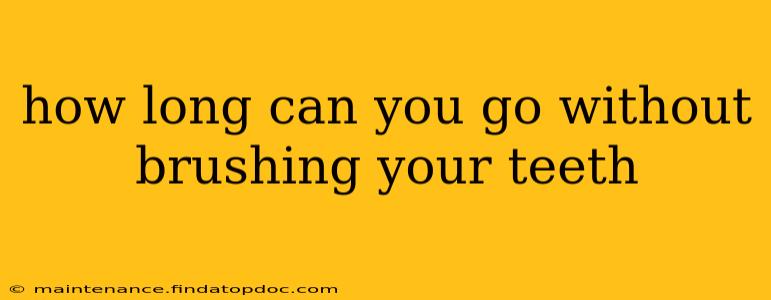How Long Can You Go Without Brushing Your Teeth?
The question of how long you can go without brushing your teeth isn't about a specific timeframe, but rather the consequences that build up over time. While you might not experience immediate, drastic effects after missing a single brushing, neglecting oral hygiene for extended periods significantly increases your risk of various dental problems. There's no magic number of days, but understanding the timeline of consequences is key.
What Happens if You Don't Brush Your Teeth for a Day?
Skipping brushing for a single day isn't a major catastrophe. However, food particles and bacteria remain on your teeth, leading to the beginnings of plaque formation. This plaque, a sticky film, is a breeding ground for harmful bacteria that produce acids attacking tooth enamel. You might notice a slightly unpleasant taste or a feeling of film on your teeth.
What Happens if You Don't Brush Your Teeth for a Week?
After a week of neglecting brushing, the consequences become more noticeable. Plaque buildup hardens into tartar, a rough substance that's difficult to remove without professional cleaning. Tartar provides an even more hospitable environment for bacteria, increasing the risk of gingivitis (gum inflammation), bad breath (halitosis), and cavities. Your gums might become red, swollen, and bleed easily when brushing.
What Happens if You Don't Brush Your Teeth for a Month?
A month without brushing results in a significant accumulation of tartar and plaque. Gingivitis could progress to periodontitis, a more severe form of gum disease that damages the soft tissues and bone supporting your teeth. This can lead to loose teeth, tooth loss, and even more serious health issues, as there's growing evidence linking gum disease to heart disease, stroke, and diabetes. Severe bad breath becomes a persistent problem. Cavities are much more likely to develop and worsen.
What Happens if You Don't Brush Your Teeth for Longer Periods?
Prolonged neglect of oral hygiene leads to a rapid deterioration of oral health. Beyond the previously mentioned issues, you could experience severe pain, abscesses (pus-filled pockets), and the need for extensive dental work, including extractions and possibly implants. The cumulative damage can become irreversible, leading to significant long-term health problems and costly dental treatments.
How Often Should You Brush Your Teeth?
The American Dental Association (ADA) recommends brushing your teeth twice a day, for at least two minutes each time, using fluoride toothpaste. This helps remove food particles, plaque, and bacteria, keeping your mouth healthy and preventing the problems outlined above.
What Other Oral Hygiene Practices Should I Follow?
Brushing alone isn't enough. Flossing daily is equally crucial to remove food and plaque from between your teeth, where your toothbrush can't reach. Regular dental checkups and professional cleanings are also essential for maintaining optimal oral health. These appointments allow dentists to detect and address potential problems early, preventing more significant issues down the line.
Can certain medical conditions affect how often I should brush my teeth?
Yes, certain medical conditions and medications can impact your oral health and influence how frequently and thoroughly you should brush your teeth. For example, people with diabetes or those undergoing chemotherapy often experience dry mouth, increasing the risk of cavities and gum disease. It's crucial to discuss your specific circumstances with your dentist and doctor to determine the best oral hygiene routine for your individual needs.
In summary, while there's no definitive number of days you can go without brushing, the longer you wait, the more severe the consequences become. Regular brushing, flossing, and dental checkups are vital for maintaining good oral health and preventing serious complications.
